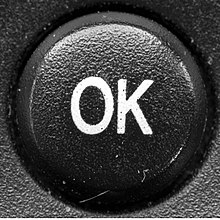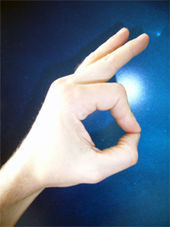OK
Okay , also OK , Ok, OK ( English [ ˌəʊˈkeɪ ] or German [ ˌoˈkeː ]) is a slang word from American English , which means almost everything correctly .
The expression is considered the most famous word in the world and is used colloquially in a wide variety of languages, including German. The origin of this word was researched and discussed for a long time by linguists until the American etymologist Allen Walker Read was able to prove in a series of articles in the magazine American Speech in 1963 and 1964 that it was a kind of linguistic joke: an intentional misspelling or more phonemic spelling (“oll correct”) of the abbreviation for “all correct” (literally everything correct ), in which nothing is right. There are also several folk etymologies .
History of the term OK
Allen Walker Read identified the first use of ok in the Boston Morning Post of March 23, 1839 in the sentence:
"He ... would have the 'contribution box', et ceteras, ok - all correct - and cause the corks to fly, like sparks, upward."
The fact that all correct was not abbreviated with AC but with OK corresponded to a fashion of those years, deliberately using abbreviations of incorrect spellings (“oll korrect”), as well as KY for “know yuse” ( no use , futile ”), KG for "Know go" ( no go , does not work) or NS for "nuff said" ( enough said , enough said ').
Finger sign
A finger sign for ok is a circle made up of the thumb and forefinger. This sign is z. B. used as a standardized diving symbol. However, this finger gesture can also have other meanings, for example it is understood by motorists and in many regions of the world (e.g. Brazil) as an insult. The closed circle represents the asshole during the abuse . The sign was included in 2010 as Emoji ? (U + 1F44C) under the name "OK Hand Sign" in Unicode 6.0 . In order not to fall into unpleasant traps due to the multiple meaning of the sign, it is advisable to use the thumbs up sign in case of doubt. This sign is interpreted worldwide as positive approval.
Operation O-KKK
In 2017, 4chan spread a rumor that this finger gesture would be a hallmark of White Supremacists . The three outstretched fingers should stand for the letter W, the circle of thumb and index finger together with the palm of the hand represent the letter P. WP is an abbreviation for “ White Power ”. The spread of this rumor was called Operation O-KKK . KKK is an abbreviation for the Ku Klux Klan , which supports White Supremacy . Even the Swedish Defense Research Institute believed this rumor and published a list of hate symbols that included this finger sign. As a result, the finger sign spread, sometimes the other way around, similar to the "Pure Looked Game" in the right-wing extremist scene. The use by the Christchurch assassin in the courtroom brought this racist use further notoriety.
Variation okidoki
A common variation of OK is okidoki , which is used as approval and as a farewell greeting. Okidoki comes from the colloquial American expression okey-doke or okey-dokey . In the USA, this is primarily a children's long expression, which became known in particular through the child actor George McFarland as Spanky in the US series Our Gang (1927–1944, in Germany: The Little Strolche ).
Folk etymologies
The following attempts at interpretation are no longer recognized as plausible by linguists:
- The following supposedly earliest use of okay has been challenged by Allen Walker Read, and its interpretation is widely accepted by linguists. In a 1790 court record from Sumner County , Tennessee , discovered in 1859 by Tennessee historian Albigence Waldo Putnam, Andrew Jackson allegedly said:
“ proved a bill of sale from Hugh McGary to Gasper Mansker, for a Negro man, which was OK ” - When used within the United States Army , the thesis that ok, an abbreviation for Order Known , is the routine confirmation of a given order.
- Another thesis is also based on an originally military use: the abbreviation for Zero Killed (roughly equivalent to : No own losses ), i.e. 0K .
- The thesis that this term, which appears so typically US-American, was coined by the German General Wilhelm von Steuben in the USA in the middle of the 18th century when he made a name for himself as a military leader refers again to the military sector . As part of his correspondence, Von Steuben initially confirmed documents with oll correct (“everything in order”), since he simply wrote the term all correct as he understood it phonetically . Soon this “oll correctly” was known throughout the military and only the abbreviation ok was used there. However, “correct” was still spelled “correct” in 18th century German.
- The story from the time of the immigrants also refers to a lack of spelling skills. These were searched at customs, and if the luggage was in order, the unskilled workers noted the abbreviation for oll klear , ok, on the note, correct all clear .
- Old Kinderhook was the nickname of the US President Martin Van Buren (1837-1841) from Kinderhook, New York , who was abbreviated to OK for election campaign purposes .
- Another answer to the question of origin lies in West Africa. Slaves brought the expression with them to America. This assumption goes back to a finding by the African linguist David Dalby, who found a word woukay in the West African language Wolof , which means something like "in order".
- Another explanation is the fact that all clear / correct could hardly be abbreviated as AC , since both A and C are phonetically ambiguous. OK comes closest to the pronounced all clear .
- OK would also be possible as an abbreviation for by Order of the King , on the orders of the King.
- Another thesis sees the Choctaw word (Choctaw = Indian tribe) okeh as a source for "OK". The first evidence of this can be found as early as 1825, and Choctaw was given as origin in dictionaries well into the 20th century (until Allen Read represented the origin of "all correct" and distribution by Martin van Buren).
- A widespread attempt at explanation leads OK back to the initials of a control employee in a company who is said to have confirmed the quality of products or the like with his signum. However, there is no further indication of this.
- The word could go back to a habit of German printers in New York to copy error-free printing plates with the abbreviation “oK” for “without correction”.
literature
- Allan Metcalf: OK: The Improbable Story of America's Greatest Word . Oxford University Press, Oxford 2011, ISBN 978-0-19-537793-4 .
Web links
- About the origin of the American-English OK
- Article from Die Zeit about the origin of the word OK
- Are you okay so far? - Article in the Süddeutsche Zeitung about the origin of the word
- Jim Fay, Ph.D .: The Choctaw Expression "Okeh" and the Americanism "Okay"
- Where does the word OK actually come from?
- Is instead of "o. k. ”also“ ok ”okay? Opinion of the Duden editorial team on the spelling
- On the use of language and with numerous notes on usage: “Why does everyone say okay?” In the features section of the FAZ on November 7, 2011
Individual evidence
- ↑ Duden
- ^ Oxford Dictionaries
- ↑ Merriam-Webster Online
- ↑ American Heritage Dictionary (easy to understand English summary of the results of the following six scientific articles)
- ^ Read, Allen W. (1963) The first stage in the history of "OK" . American Speech , 38 (1), 5-27.
- ^ Read, Allen W. (1963). The second stage in the history of "OK" . American Speech , 38 (2), 83-102.
- ^ Read, Allen W. (1963). Could Andrew Jackson spell? . American Speech , 38 (3), 188-195.
- ^ Read, Allen W. (1964). The folklore of "OK" . American Speech , 39 (1), 5-25.
- ^ Read, Allen W. (1964). Later stages in the history of "OK" . American Speech , 39 (2), 83-101.
- ^ Read, Allen W. (1964). Successive revisions in the explanation of "OK" . American Speech , 39 (4), 243-267.
- ↑ Other countries, other gestures , Welt am Sonntag, January 17, 2010
- ↑ OK Hand Sign Emoji. In: Emojipedia . Retrieved June 1, 2017 .
- ↑ No, the "OK" Gesture Is Not a Hate symbol. Anti-Defamation League, May 1, 2017, accessed June 28, 2018 .
- ↑ Det vita hatet: radikal nationalism i digitala miljöer. Totalförsvarets forskningsinstitut , November 13, 2017, p. 32 , accessed on June 28, 2018 (Swedish).
- ↑ Konrad Litschko: The right-wing terrorist of Christchurch: Executor of an ideology . In: The daily newspaper: taz . March 16, 2019, ISSN 0931-9085 ( taz.de [accessed October 11, 2019]).
- ↑ Saying Index
- ↑ George W. Stimpson. (1934) “Nuggets Of Knowledge”
- ↑ Gö: Where does the abbreviation OK come from? In: Berliner Morgenpost . November 7, 1998.
- ↑ Katja Römhild: Oll Correct! Or: Four letters moved out to conquer the world ( page no longer available , search in web archives ) Info: The link was automatically marked as defective. Please check the link according to the instructions and then remove this notice. . In: LEO - Lingua et Opinio, TU Chemnitz, May 18, 2005. Retrieved October 14, 2011.
- ↑ Questions without an answer: Where does the abbreviation "Ok" come from and what does it mean? ( Memento of the original from October 7, 2011 in the Internet Archive ) Info: The archive link was inserted automatically and has not yet been checked. Please check the original and archive link according to the instructions and then remove this notice. Retrieved October 14, 2011.
- ↑ deutschlandfunkkultur.de: Why is internet a foreign word - and jam not?

